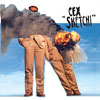Cex, "Sketchi"
 Rjyan Kidwell is going on ten years of musical output and his music is growing accordingly. Of his most recent endeavors, Sketchi is his most immediately mature work, abandoning what might be called his more adolescent tendencies in all places except the artwork that accompanies the record. Don't be fooled by the "Twin Towers" cover, Cex's newest is one of his most sober releases to date.
Rjyan Kidwell is going on ten years of musical output and his music is growing accordingly. Of his most recent endeavors, Sketchi is his most immediately mature work, abandoning what might be called his more adolescent tendencies in all places except the artwork that accompanies the record. Don't be fooled by the "Twin Towers" cover, Cex's newest is one of his most sober releases to date.
Temporary Residence
Taking Cex seriously is, in some ways, a difficult thing to do. His records are notoriously scattershot, spanning genres and attitudes without any respect for notions of continuity or artistic integrity. In a way this is half of his appeal; an artist willing to disregard any sense of expectation deserves a lot of respect, even if that artist fails to reach whatever goals they'd laid out for themselves. Given his tendency to act and record spastically, Sketchi comes as a massive surprise. It's incredibly low key, completely devoid of vocals, and carries a moodiness with it that speaks of a wide and reflective attitude not normally afforded to Kidwell's work. "Damon Kvols" kicks the album off with a statement of intent. It is over ten minutes long, is dominated by an almost jazzy rhythm track, and bounces atmospheric effects and vague melodies as though they were simple playthings. Kidwell's compositions are simple, almost minimal at times, and develop in slow motion as various effects and unusual samples intertwine with each other like lovers trapped in a world that progresses at half the normal speed. This is not a snap-of-the-finger, breakneck-speed record: it's calculated and willing to let its colors show at whatever pace is necessary.
It's hard to describe what much of the record sounds like because it is both varied and consistent. The predominance of strong rhythms sits most centrally in my mind when I think of its main constituents, but the unusual use of washed-out synthetic sounds and unpredictable, noisy samples carries the album from beginning to end. "Goodby Says" is an excellent example of the rest of the record. It proceeds at a medium pace, teetering back and forth with a lumbering, tribal drum track and cascading electronics that seem to emerge organically from a background of percolating submarine sounds. It doesn't catch my attention as one of the best songs on the album because of any spontaneity, it is the uneasy quavering of the piece that sits so firmly in my mind. Though it is a persistent song, a sense of dread and unease rests just below its surface. The music is double-sided in this way: there is the immediate reaction I have to the grooves and sounds set out by Kidwell and then a secondary reaction resulting from what the music suggests beyond the immediacy of its components.
This isn't to say that Cex's music isn't fun anymore, that he's just suddenly grown up and become a "serious" musician, whatever that means. Elements of what fully appears on Sketchi have been around since Kidwell started releasing his music for mass consumption and despite much of the album proceeding at a relaxed pace, there are tunes that rock out in a certain sense. "Or Egon Ridge" begins with a crashing line of cymbals and sharp drums more abrasive than much of anything else on the record. This kind of introduction sets the pace for the rest of the song, which bashes away at various volumes and with varying degrees of emphasis on the rhythm. Kidwell moves deftly between his electronic washes and the more definite elements of his songs, letting the two work together instead of contrasting them persistently throughout the record. "Suffocating Champion," however, almost entirely drops the drums from the mix. The result is a deep foreboding, an unsettled mood that feels like the prelude to a horrible event. "God Blessing" sounds hopeful, though, and serves as the resolve of the entire album. It, too, is beat-less and focuses on Kidwell's manipulation of various textures and interweaving samples. Given the nature of the rest of Sketchi, it's a surprising and beautiful ending. Sketchi is limited to 1,000 copies and once word spreads around about how unbelievably good it is, those copies will likely go away quite quickly.
samples:



